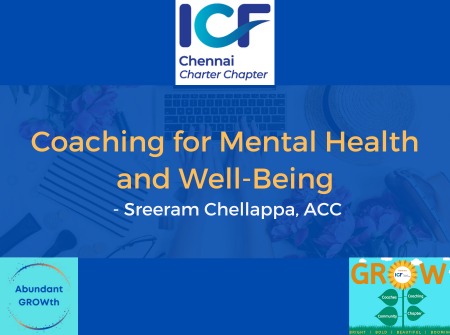Coaching for mental health and well-being

A fourteen-year-old child who needs help with her mental health was one of the very early clients I had the chance to coach. Even though I was nervous, coaching helped her make friends, focus on what she loved instead of what her folks wanted her to do, and get over being alone.
After that, I found out that every two out of the five coaching clients had different levels of mental health issues and needed to change the way they thought. This made me learn more about mental health and wellness as a coach.
Mental health mostly refers to the health of our brains and our emotional stability. Mental wellness, on the other hand, is a more general term that includes all the things that make us feel good about how we’re doing in general.
Mental health problems have gotten worse around the world, and COVID-19 has made them even worse. According to a recent study from Deloitte, 15% of the global mental health burden is due to the high number of mental illnesses in India. There are big differences in how people are treated for mental illnesses, mostly because of the stigma that still surrounds them.
Therapy is the gold standard for mental health treatment. Sometimes therapy is unavailable, or we hesitate to approach because of location, finances, or social stigma attached to it. Thankfully, there are things you can do to improve your mental health without the above concern.
Self-healing is one technique any individual can use in the early stages when symptoms occur. It’s not replacing traditional therapy with a professional, but it can supplement your mental health efforts. When you don’t have immediate access to therapy, this self-help strategy is best advocated for those with moderate symptoms that don’t affect their daily tasks.
Journaling: Write down your thoughts and feelings, and reflecting on them can help you identify negative thoughts and behavior patterns. Once you’re aware, you can take meaningful steps toward making changes.
Stay connected to others: Connect with people experiencing similar things. Studies show that connecting to others can provide a sense of meaning and purpose and decrease loneliness. Group therapy or support groups are typically led by a mental health professional or group leader and can be low-cost or free. Whether it be friends, family, or strangers, sharing your feelings and experiences is essential.
Practicing mindfulness and meditation: Mindfulness Meditation helps you become more attuned to what you’re feeling and thinking, which allows you to manage your thoughts and emotions more effectively rather than becoming overwhelmed by them. Mindfulness can help you manage symptoms of anxiety and other mental health disorders by helping you understand and cope with what you’re feeling. Studies show that meditation can help reduce stress, alleviate symptoms of depression or anxiety, and help you sleep.
Few other practical tips to improve your mental health without therapy are exercise, go outside and soak up in the sun, prioritize your sleep, take a step back from social media, improve social skills, exhibit Gratitude, good Nutrition, & set small achievable goals.
Coaches need to know the difference between mental health problems that aren’t clinical and those that are. Having this knowledge gives the coaches the ability to work in a variety of mental health coaching settings.
In brief, mental health coaches facilitate inner communication with the intention of fostering self-integration and the process of recovery. Over time, external communication (with others) originates from a more genuine and harmonious position.
I greatly benefited from the Institute of Coaching’s mental health literacy program for coaches in cooperation with Mc Clean Hospital, a Harvard Medical School affiliate. I learned that coaches may help clients early in symptoms and work alongside therapy.
You can connect with Sreeram Chellappa- Click Here
Sreeram Chellappa
The views and opinions expressed in guest posts featured on this blog are those of the author and do not necessarily reflect the opinions and views of the International Coach Federation (ICF). The publication of a guest post on the ICF Blog does not equate to an ICF endorsement or guarantee of the products or services provided by the author.
Additionally, for the purpose of full disclosure and as a disclaimer of liability, this content was possibly generated using the assistance of an AI program. Its contents, either in whole or in part, have been reviewed and revised by a human. Nevertheless, the reader/user is responsible for verifying the information presented and should not rely upon this article or post as providing any specific professional advice or counsel. Its contents are provided “as is,” and ICF makes no representations or warranties as to its accuracy or completeness and to the fullest extent permitted by applicable law specifically disclaims any and all liability for any damages or injuries resulting from use of or reliance thereupon.


Addressing mental health issues, being open to receive and offer support thereof is one of the topical themes more so prevalent in the recent years. Sreeram – I very much like the lucid flow, resting on acquired experiences and expertise that you possess. Self-healing techniques that you have articulated would go a long way to take care of oneself, especially when symptoms are noticed early enough and also when professional therapy is not available or accessible.
Great post. I’m dealing with many oof these issues as well..
Here iss my webpage :: https://telegra.ph/Kakie-sloty-v-onlajn-kazino-Vavada-mozhno-nazvat-naibolee-populyarnymi-12-23
Thank you for your sharing. I am worried that I lack creative ideas. It is your article that makes me full of hope. Thank you. But, I have a question, can you help me?
Thank you for your sharing. I am worried that I lack creative ideas. It is your article that makes me full of hope. Thank you. But, I have a question, can you help me?